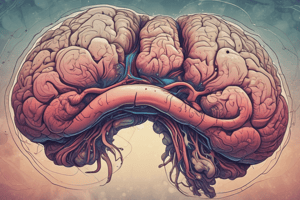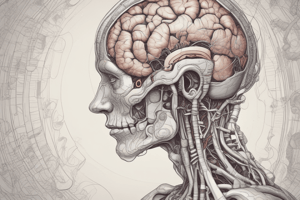Podcast
Questions and Answers
What is the primary function of the central nervous system in relation to the body's responses to internal and external stimuli?
What is the primary function of the central nervous system in relation to the body's responses to internal and external stimuli?
Controlling and coordinating the body's responses
What are the three main parts of the brain, and what are their respective functions?
What are the three main parts of the brain, and what are their respective functions?
Cerebrum (higher brain functions), cerebellum (coordination and balance), and brainstem (controls vital functions)
What is the role of the spinal cord in the human nervous system?
What is the role of the spinal cord in the human nervous system?
Transmits nerve impulses between the brain and the rest of the body
What is the function of the cerebrum in the human nervous system?
What is the function of the cerebrum in the human nervous system?
What is the primary function of the brainstem in relation to the body's vital functions?
What is the primary function of the brainstem in relation to the body's vital functions?
What is the main function of the somatic nervous system, and how does it enable the body to respond to changes in its internal and external environment?
What is the main function of the somatic nervous system, and how does it enable the body to respond to changes in its internal and external environment?
What is the primary difference between the sympathetic and parasympathetic nervous systems, and how do these differences impact the body's physiological responses?
What is the primary difference between the sympathetic and parasympathetic nervous systems, and how do these differences impact the body's physiological responses?
What are the roles of neurotransmitters such as acetylcholine, dopamine, and serotonin in the functioning of the nervous system, and how do imbalances in these neurotransmitters contribute to various disorders?
What are the roles of neurotransmitters such as acetylcholine, dopamine, and serotonin in the functioning of the nervous system, and how do imbalances in these neurotransmitters contribute to various disorders?
What are the characteristic features of disorders such as Alzheimer's disease, Parkinson's disease, and multiple sclerosis, and how do these disorders impact the functioning of the nervous system?
What are the characteristic features of disorders such as Alzheimer's disease, Parkinson's disease, and multiple sclerosis, and how do these disorders impact the functioning of the nervous system?
What is the significance of the human nervous system in controlling and coordinating the body's functions, and why is it essential to understand the nervous system in order to understand human health and disease?
What is the significance of the human nervous system in controlling and coordinating the body's functions, and why is it essential to understand the nervous system in order to understand human health and disease?
Flashcards are hidden until you start studying
Study Notes
Human Nervous System
The human nervous system is a complex network of cells and tissues that coordinate and control the functioning of the body. It is responsible for processing sensory information, interpreting and responding to that information, and maintaining homeostasis. The nervous system consists of two main parts: the central nervous system (CNS) and the peripheral nervous system (PNS).
Central Nervous System
The central nervous system includes the brain and spinal cord. It is responsible for controlling and coordinating the body's responses to internal and external stimuli. The brain's functions include thinking, learning, memory, and controlling the body's functions, such as breathing, heart rate, and digestion. The spinal cord transmits nerve impulses between the brain and the rest of the body.
Brain
The brain is the control center of the nervous system. It is divided into three main parts: the cerebrum, the cerebellum, and the brainstem. The cerebrum is responsible for higher brain functions such as thinking, learning, and memory. The cerebellum controls coordination and balance. The brainstem connects the brain to the spinal cord and controls vital functions such as breathing, heart rate, and blood pressure.
Spinal Cord
The spinal cord is a long, thin bundle of nerve fibers that runs from the brain down the back of the body. It transmits nerve impulses between the brain and the rest of the body. It is protected by the vertebral column.
Peripheral Nervous System
The peripheral nervous system includes all the nerves outside of the brain and spinal cord. It is divided into two main parts: the somatic nervous system and the autonomic nervous system.
Somatic Nervous System
The somatic nervous system controls the body's voluntary movements and sensations. It includes the motor nerves, which control muscles, and the sensory nerves, which detect changes in the body.
Autonomic Nervous System
The autonomic nervous system controls the body's involuntary functions, such as heart rate, blood pressure, and digestion. It is divided into two branches: the sympathetic nervous system, which prepares the body for action (the "fight or flight" response), and the parasympathetic nervous system, which conserves energy (the "rest and digest" response).
Neurotransmitters
Neurotransmitters are chemical messengers that transmit signals between nerve cells. They play a crucial role in the functioning of the nervous system. Some common neurotransmitters include:
- Acetylcholine: involved in learning and memory, attention, and muscle control
- Dopamine: involved in reward and pleasure, and motor control
- Serotonin: involved in mood regulation, appetite, and sleep
- Glutamate and GABA: involved in learning and memory
Nervous System Disorders
There are many nervous system disorders, including:
- Alzheimer's disease: a progressive, irreversible brain disorder
- Parkinson's disease: a movement disorder characterized by tremors, rigidity, and difficulty with balance and coordination
- Multiple sclerosis: an autoimmune disease that damages the protective covering of nerve fibers
- Epilepsy: a disorder characterized by recurrent seizures
- Stroke: damage to the brain caused by a lack of blood flow
Conclusion
The human nervous system is a complex and fascinating system that plays a crucial role in controlling and coordinating the body's functions. Understanding this system is crucial for understanding human health and disease.
Studying That Suits You
Use AI to generate personalized quizzes and flashcards to suit your learning preferences.




